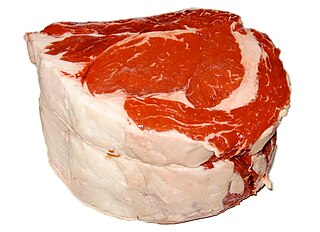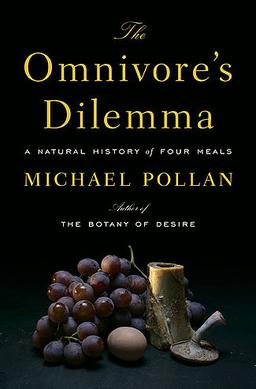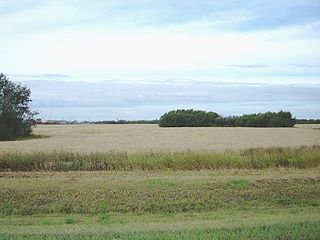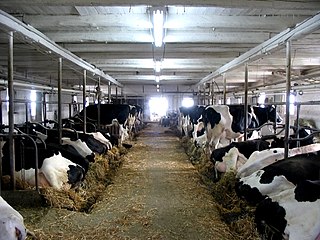
Veal is the meat of calves, in contrast to the beef from older cattle. Veal can be produced from a calf of either sex and any breed; however, most veal comes from young male calves of dairy breeds which are not used for breeding. Generally, veal is more expensive by weight than beef from older cattle. Veal production is a way to add value to dairy bull calves and to utilize whey solids, a byproduct from the manufacturing of cheese.

Beef is the culinary name for meat from cattle.

Animal husbandry is the branch of agriculture concerned with animals that are raised for meat, fibre, milk, or other products. It includes day-to-day care, selective breeding, and the raising of livestock. Husbandry has a long history, starting with the Neolithic Revolution when animals were first domesticated, from around 13,000 BC onwards, predating farming of the first crops. By the time of early civilisations such as ancient Egypt, cattle, sheep, goats, and pigs were being raised on farms.

There are different systems of feeding cattle in animal husbandry. For pastured animals, grass is usually the forage that composes the majority of their diet. Cattle reared in feedlots are fed hay supplemented with grain, soy and other ingredients to increase the energy density of the feed. The debate is whether cattle should be raised on fodder primarily composed of grass or a concentrate. The issue is complicated by the political interests and confusion between labels such as "free range", "organic", or "natural". Cattle raised on a primarily foraged diet are termed grass-fed or pasture-raised; for example meat or milk may be called grass-fed beef or pasture-raised dairy. The term "pasture-raised" can lead to confusion with the term "free range", which does not describe exactly what the animals eat.
Jennifer Abbott is a Sundance and Genie award-winning film director, writer, editor, producer and sound designer who specializes in social justice and environmental documentaries.

Canada is one of the largest agricultural producers and exporters in the world. As with other developed nations, the proportion of the population agriculture employed and agricultural GDP as a percentage of the national GDP fell dramatically over the 20th century, but it remains an important element of the Canadian economy. A wide range of agriculture is practised in Canada, from sprawling wheat fields of the prairies to summer produce of the Okanagan valley. In the federal government, overview of Canadian agriculture is the responsibility of the Department of Agriculture and Agri-Food.

Hillside Animal Sanctuary, based in Frettenham, Norwich, and with a site at West Runton, North Norfolk, is the United Kingdom's largest home for different kinds of farm animals and horses. The vegan-run sanctuary is funded entirely on public donations. The sanctuary was established by Wendy Valentine and its patron is actor Martin Shaw.

Beef cattle are cattle raised for meat production. The meat of mature or almost mature cattle is mostly known as beef. In beef production there are three main stages: cow-calf operations, backgrounding, and feedlot operations. The production cycle of the animals starts at cow-calf operations; this operation is designed specifically to breed cows for their offspring. From here the calves are backgrounded for a feedlot. Animals grown specifically for the feedlot are known as feeder cattle, the goal of these animals is fattening. Animals not grown for a feedlot are typically female and are commonly known as replacement heifers. While the principal use of beef cattle is meat production, other uses include leather, and beef by-products used in candy, shampoo, cosmetics, and insulin.

Gene Baur, formerly known as Gene Bauston, is an author and activist in the animal rights and food movement. He’s been called the "conscience of the food movement" by Time magazine, and opposes factory farming and advocates for what he believes would be a more just and respectful food system. Baur is president and co-founder of Farm Sanctuary, a farm animal protection organization. He is vegan and has been involved with animal rights since he co-founded Farm Sanctuary in 1986. Baur has authored two books and various articles.

The Omnivore's Dilemma: A Natural History of Four Meals is a nonfiction book written by American author Michael Pollan published in 2006. As omnivores, humans have a variety of food choices. In the book, Pollan investigates the environmental and animal welfare effects of various food choices. He suggests that, prior to modern food preservation and transportation technologies, the dilemmas caused by these options were resolved primarily by cultural influences.

Agriculture in Saskatchewan is the production of various food, feed, or fiber commodities to fulfill domestic and international human and animal sustenance needs. The newest agricultural economy to be developed in renewable biofuel production or agricultural biomass which is marketed as ethanol or biodiesel. Plant cultivation and livestock production have abandoned subsistence agricultural practices in favor of intensive technological farming resulting in cash crops which contribute to the economy of Saskatchewan. The particular commodity produced is dependent upon its particular biogeography or ecozone of Geography of Saskatchewan. Agricultural techniques and activities have evolved over the years. The first nation nomadic hunter-gatherer lifestyle and the early immigrant ox and plow farmer proving up on his quarter section of land in no way resemble the present farmer operating huge amounts of land or livestock with their attendant technological mechanization. Challenges to the future of Saskatchewan agriculture include developing sustainable water management strategies for a cyclical drought prone climate in south western Saskatchewan, updating dryland farming techniques, stabilizing organic definitions or protocols and the decision to grow, or not to grow genetically modified foods. Domestically and internationally, some commodities have faced increased scrutiny from disease and the ensuing marketing issues.

Intensive animal farming, industrial livestock production, and macro-farms, also known by opponents as factory farming, is a type of intensive agriculture, specifically an approach to animal husbandry designed to maximize production, while minimizing costs. To achieve this, agribusinesses keep livestock such as cattle, poultry, and fish at high stocking densities, at large scale, and using modern machinery, biotechnology, and global trade. The main products of this industry are meat, milk and eggs for human consumption. There are issues regarding whether intensive animal farming is sustainable in the social long-run given its costs in resources. Analysts also raise issues about its ethics.

Meet Your Meat is a 2002 documentary about factory farming created by People for the Ethical Treatment of Animals (PETA), narrated by Alec Baldwin, and directed by Bruce Friedrich and Cem Akin. The documentary explores the treatment of animals in modern animal agriculture. The film runs 12 minutes long.

Eating Animals is the third book by the American novelist Jonathan Safran Foer, published in 2009. A New York Times best-seller, Eating Animals provides a dense discussion of what it means to eat animals in an industrialized world. It was written in close collaboration with Farm Forward, a US nonprofit organization promoting veganism and sustainable agriculture.

Dairy farming is one of the largest agricultural sectors in Canada. Dairy has a significant presence in all of the provinces and is one of the top two agricultural commodities in seven out of ten provinces.

Vegucated is a 2011 American documentary film that explores the challenges of converting to a vegan diet. It "follows three meat- and cheese-loving New Yorkers who agree to adopt a vegan diet for six weeks."
Ag-gag laws are anti-whistleblower laws that apply within the agriculture industry. Popularized by Mark Bittman in an April 2011 The New York Times column, the term ag-gag typically refers to state laws in the United States of America that forbid undercover filming or photography of activity on farms without the consent of their owner—particularly targeting whistleblowers of animal rights abuses at these facilities. Although these laws originated in the United States, they have also begun to appear elsewhere, such as in Australia and Canada.

Farmageddon: The True Cost of Cheap Meat is a 2014 non-fiction book by Philip Lymbery and Isabel Oakeshott. It surveys the effects of industrial livestock production and industrial fish farming around the world. The book is the result of Lymbery's investigations for which he travelled the world over three years. Isabel Oakeshott is the political editor of The Sunday Times, Lymbery is CEO of Compassion in World Farming. The book was published by Bloomsbury.
Animal welfare and rights in Canada is about the laws concerning and treatment of nonhuman animals in Canada. Canada has been considered to have weak animal welfare protections by the organization World Animal Protection. The vast majority of Canadians are for further animal protections, according to a poll conducted on behalf of Mercy for Animals.

Carnage is a 2017 mockumentary directed by Simon Amstell. Set in the year 2067, when veganism is the norm, the film looks back on meat-eating today. It premiered on BBC iPlayer.
















